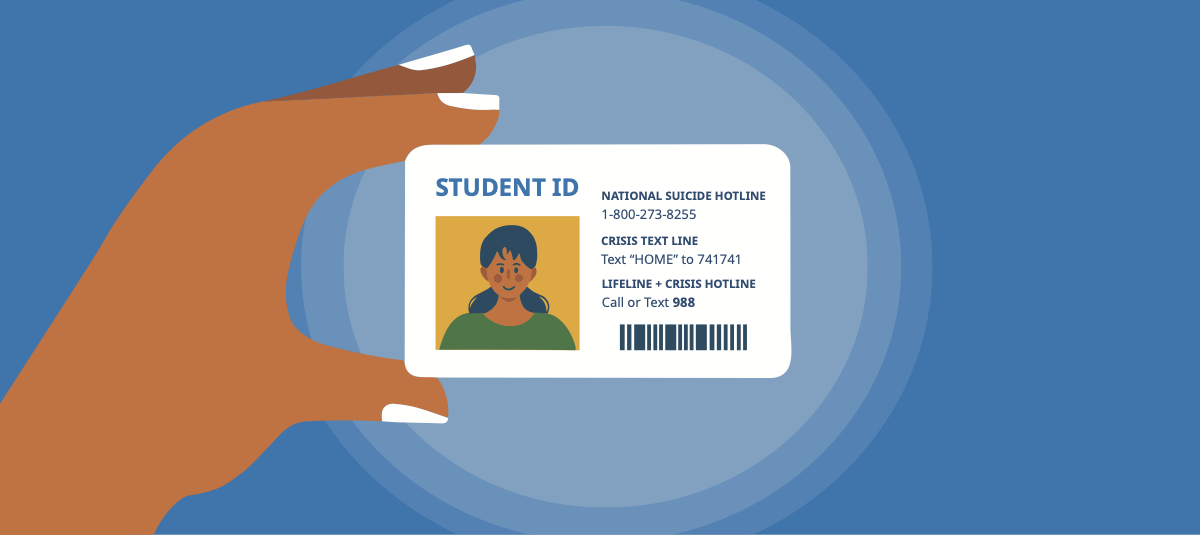Content Warning: This piece contains mentions of suicide.
Getting involved in mental health advocacy in our youth is not easy, but with the emergence of bills like the Student ID Bill (a proposal for schools to print mental health hotline numbers, such as 988, on the back of student ID cards), opportunities for upcoming generations are there. With this in mind, it’s important to understand how and why we should advocate for ourselves as youth and be familiar with the mental health legislation being put forth in our country.
As a mental health advocate and former Active Minds Chapter member, I’m excited to share more about my experience advocating for mental health policies and why the Student ID bill is so critical for today’s students:
- How did you get involved in mental health advocacy?
My involvement in activism stems from a personal connection to mental health. My struggles with mental health cast a dark shadow over many of my experiences as a teenager. They were compounded by the cultural shame I faced when seeking treatment as an Asian-Indian woman. The cultural stigma I endured fueled my passion for activism at the age of 14. Embracing vulnerability by sharing my story has allowed me to foster deep connections with the people in my life. We as humans are sentient beings who are unified in our struggles — and by bringing these struggles to the forefront of our existence and conversations, we realize that we’re not alone. - Why must youth and young adults be aware of legislation being proposed at local, state, and federal levels?
Systemic change in our mental health system is dependent on policy initiatives at the local, state, and federal levels. As young adults, we must be aware of the state of our mental health system because we are the future. Our voices matter, and the decisions made now will impact our futures and the futures of generations to come.
- What is the Student ID Bill?
The Student ID Bill (formally titled the “Increasing Mental Health Access for Students Act”) is a proposal that states that schools would print mental health hotline numbers (including 988) on the back of student ID cards. In California, this is already a requirement for all public, private, and charter schools.
- Why is this bill important in supporting the mental health of youth and young adults?
Since its conception in July 2021, the 988 hotline (previously 1-800-273-TALK) has experienced an increase of 48% in the number of calls and 263% in the number of texts. The data is clear: youth and young adults utilize 988, and having this number on the back of an ID card can be life-saving for students or their peers. Having access to a crisis hotline also promotes help-seeking behaviors and can further de-stigmatize the misinformation that surrounds 988 (for example, less than 2% of calls are dispatched to emergency medical services).
Suicide is a leading cause of death for young people. Students today are commonly experiencing feelings of loneliness, depression, and anxiety at disproportionate levels. In 2021, 1 in 5 students considered attempting suicide, and 1 in 10 students attempted suicide. More than 40% of students reported that they felt persistent feelings of sadness and hopelessness. However, data has also shown that mental health resources are becoming increasingly utilized. - How have you supported the bill, and what success have you seen from those actions?
As an activist, this bill is deeply personal to me. I have worked with the Board of Education in my hometown to have them print 988 on the back of Student ID cards in middle and high schools. Furthermore, through my Active Minds Chapter at UCLA, we fought to have crisis hotlines printed on the back of our ID cards in 2019. At the White House Mental Health Youth Action Forum back in 2020, I spoke about the importance of implementing this policy nationwide. - How can other young and young adults get involved in advocacy work around the Student ID Bill and other proposed mental health policies?
As I’ve learned from pursuing a career in mental health policy, it is essential for all of us to familiarize ourselves with our local representatives and learn about the mental health initiatives in our districts. Starting on a local level, such as in your hometown, is a great way to get your foot in the door into the field of policy work. Your voice always matters; never be afraid to use it.
In our world, where the challenges facing our youth have never been more complex, the Student ID Bill becomes not just a piece of legislation but a symbol of our commitment to nurturing the mental well-being of the next generation. By taking steps to be an advocate, whether at the local or national level, you contribute to the de-stigmatization of mental health across the U.S. Being a part of the conversation on your own campus is just one step to advocacy and can help others understand the legislation at play. Mental health advocacy starts with one voice and can be a catalyst for change.




